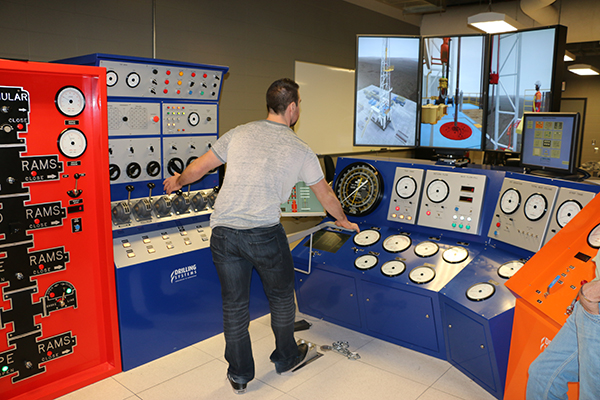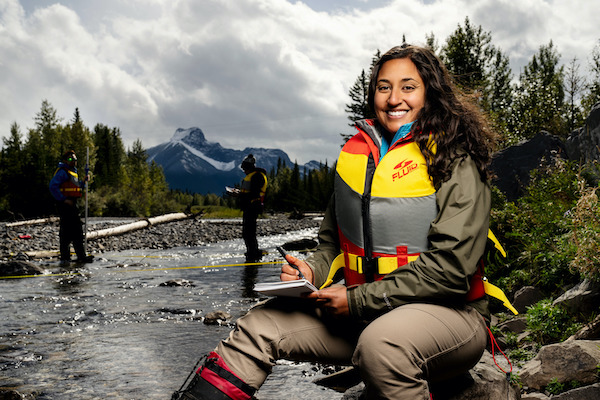On this page:
Overview
Designed to equip you with the fundamentals of petroleum land administration, this program provides a specialized education in the management of land contracts, agreements and related documentation required by the energy industry.
You will gain in-depth knowledge of leases, transfers, joint venture agreements and other vital land-related correspondences.
In this program, you will:
- master the interpretation and management of various land contracts and agreements
- develop an understanding of the legal and regulatory frameworks surrounding land administration
- develop the skills to administer land agreements that govern freehold, Crown and Aboriginal lands
- gain the knowledge to work effectively within land departments of energy companies, government bodies and land consultancy firms.
Prepare for various roles in land administration, with potential positions including petroleum land administrator, land clerk or land officer.
The petroleum industry is always seeking skilled personnel to handle complex land administration tasks, and our program sets you up for success in this field.
If you are looking for a role that combines the petroleum industry's legal, technical and administrative aspects, this program is for you.
To work in petroleum land administration, you need:
- written and verbal communication skills
- analytical, time-management and problem-solving skills
- organizational skills and attention to detail
- patience
- ability to work with little supervision
- computer skills.
You should enjoy following clear rules, keeping organized, and dealing with legal matters.
After successfully completing this program, you'll receive a SAIT Petroleum Land Administration certificate.
Careers and opportunities
Each year, SAIT conducts a survey between February and April to determine the employment rate, salary and satisfaction of our newest SAIT alumni.
![]() 100% graduate employment rate
100% graduate employment rate
Find out more about our graduate employment statistics >
Our graduates may work in the following occupations. Some careers require additional experience and education.
Associated National Occupational Classification (NOC) codes: 12102, 10029, 14301, 41401.

Career planning support
Unsure which career path is for you? Here are some recommended career planning resources to help you decide your future.
You can also head to Alberta alis for lots of information about careers in Alberta, including quizzes and labour market information to help you narrow down a path.
Finally, you can take our online career finder quiz, which can help narrow your options based on your current skills and interests.
Courses
The Petroleum Land Administration certificate requires 15 credits (six courses) to complete.
You'll have up to five years from the start of your first course to complete all required courses.
| Course | Credits |
|---|---|
|
As the first course of the Petroleum Land Administration Certificate Program at SAIT, this course introduces the student to a basic understanding of key concepts in land administration including: Federal and Provincial land history and ownership; the role of land administration; land survey systems, Table of Formations; Crown Mineral Tenure (AB, SK & BC); Freehold Mineral Tenure; and Surface rights in Alberta. |
1.5 |
|
This course introduces the student to a basic understanding of documentation associated with freehold leases, Alberta, British Columbia and Saskatchewan Crown leases including special topics such as unitization, rentals, caveats, transfers, assignments and continuations. Pre-requisites:
|
3 |
|
This course covers the various joint venture agreements created and administered by the Land Department. Some of the Agreements covered include Joint Operating Agreements, Farmin/Farmout Agreements, Option Agreements, Pooling Agreements, Royalty Agreements, Notice of Assignment and so on. Also covered are various industry procedures such as CAPL Operating Procedure, Farmout and Royalty Procedure and Assignment Procedure. Exercises and Assignments relate to contract review and interpretation. Pre-requisites:
|
3 |
|
An excellent review of land administration for anyone in the field, this course is also a valuable tool to assist those new to land administration in applying their knowledge to current, industry relevant examples. Various methods discussed and completed to update records for continuation, various obligations, changes in working interests, royalties, producing lands, and unitization. Incorporates an introduction to a land system software. Pre-requisites:
|
3 |
|
Introduces the structure of a typical Surface Land Department; land titles and Crown land record systems; survey systems; Directive 56 and its implications; third-party agreements, surface leases and right-of-way agreements; functions of the Surface Rights Board; components of surface land administration associated with acquisitions and divestitures and asset management. Pre-requisites:
|
3 |
|
This course is an excellent overview of the oil and gas industry including upstream, downstream and midstream in Alberta, Canada and around the globe. Lectures cover the history of the petroleum industry including major petroleum regions, global oil production, capacity for growth, Canadian exploration, regulation & compliance and petroleum land administration; transportation and pipelines. |
1.5 |
Progression
You must attain a PGPA and/or a CGPA of 2.0 or better each semester and pass the prerequisite courses to progress through the program.
To qualify for graduation, you must pass all courses, attain a CGPA of 2.0 or better and complete course requirements within the prescribed timelines.
Admission requirements
Applicants educated in Canada
Applicants must demonstrate English language proficiency.
There are no further admission requirements for this program.
All applicants who were educated outside of Canada must demonstrate English language proficiency and provide proof they meet the program admission requirements outlined above with an international document assessment. Find accepted educational documents and assessment options.
SAIT may also accept courses completed at certain international post-secondary institutions.

Academic Upgrading
Missing an admission requirement for this program? Upgrade your prior education to help you receive admission into one of SAIT's career programs.

English language proficiency
All applicants must demonstrate English language proficiency prior to admission, including students educated in Canada.
Transfer agreements
At SAIT, we have created transfer agreements with partner institutions to allow you to earn course credits toward your SAIT program based on your previously completed credentials.
Transfer Alberta search tool
Use the Transfer Alberta search tool to see all transfer agreements between Alberta post-secondary institutions (including those with the University of Calgary, Mount Royal University and Bow Valley College.)
Search transfer agreements in Alberta
There are no formal transfer agreements currently in place for this program.
Transfer options for graduates
When you have completed this program, you may continue your education at a partner post-secondary institution. These transfer agreements include partnerships within and/or outside of Canada.
Available intakes
Fall 2025
Start dates:
- Domestic students: Waitlisted
-
-
Application deadline: June 30, 2025
-
Costs
2025/26 tuition and fees
The following estimated costs are effective as of July 1, 2025.
The estimated total cost of tuition and fees is based on completing the program in one semester of study. Following a modified schedule will impact the fees you pay per semester and may alter final costs.
Domestic students
*You will not be eligible for the UPass in this program.
This is a bring-your-own-device program with a standard computer hardware and software requirement. See the specific requirements on our computers and laptops page.
No textbooks are required.

Financial aid
Paying for your education may feel overwhelming, but we have resources and programs that can help, including information about payment options, student loans, grants and scholarships.
This program is eligible for Canada Alberta Job Grant funding.
Application process
Ready to apply?
Follow our step-by-step guide to submitting a successful application.
Communication during admission
Email is the primary source of communication during the selection process. Ensure your personal email account is managed appropriately to receive our emails, files and communications. We recommend you add the macphail.students@sait.ca domain to your safe senders' list or you risk missing critical email messages.

Begin your application
Apply now using the online application portal.
Ensure you have a valid Visa or Mastercard to pay the non-refundable application fee of $120 for domestic applicants.
Information sessions
Prepare for a strong start in your chosen program or get the details you need to decide your future path.
Our expert staff and faculty are ready to answer your questions and provide information about the following:
- What sets SAIT apart
- An introduction to the program and area of study
- Admission requirements
- Future career paths
- Information on the earning potential and graduate employment rates.
Contact us
MacPhail School of Energy
-
Phone - 403.284.8451
Subscribe for updates
Your journey starts here! Sign up to get important updates on:
- Energy and environment programs
- Application information
- Relevant news and events

Oki, Âba wathtech, Danit'ada, Tawnshi, Hello.
SAIT is located on the traditional territories of the Niitsitapi (Blackfoot) and the people of Treaty 7 which includes the Siksika, the Piikani, the Kainai, the Tsuut’ina and the Îyârhe Nakoda of Bearspaw, Chiniki and Goodstoney.
We are situated in an area the Blackfoot tribes traditionally called Moh’kinsstis, where the Bow River meets the Elbow River. We now call it the city of Calgary, which is also home to the Métis Nation of Alberta.




